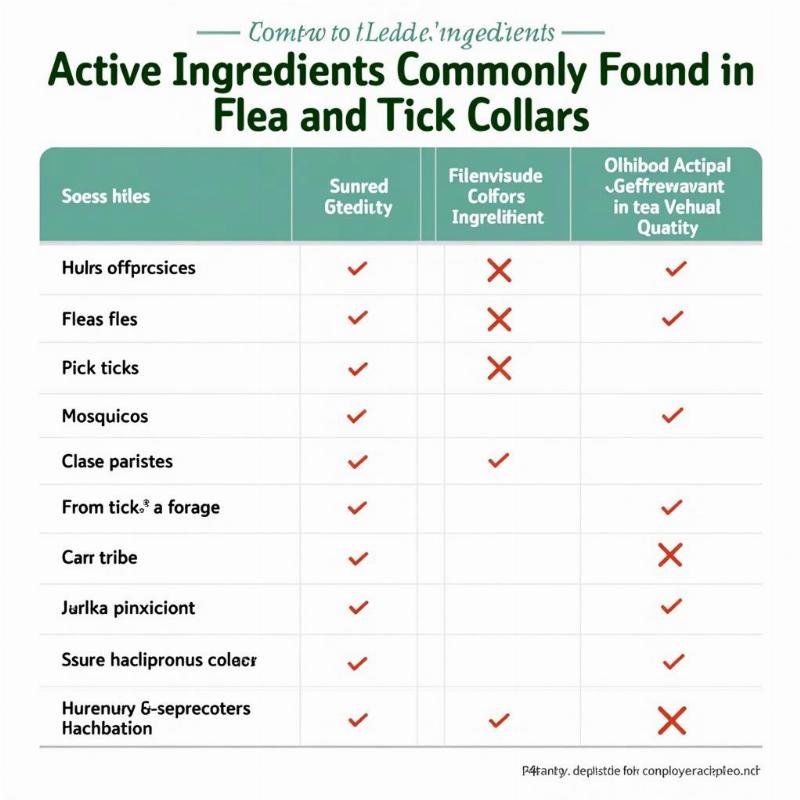Protecting your furry friend from pesky parasites like fleas, ticks, and mosquitoes is crucial for their health and happiness. Flea, tick, and mosquito collars for dogs offer a convenient and long-lasting solution to keep these biting bugs at bay. But with so many options on the market, choosing the right collar can be overwhelming. This guide will walk you through everything you need to know about flea, tick, and mosquito collars for dogs, helping you make an informed decision to protect your beloved companion.
Understanding the Importance of Flea, Tick, and Mosquito Control
Fleas, ticks, and mosquitoes are more than just annoying pests; they can transmit serious diseases to your dog. Fleas can cause skin irritation, allergies, and even tapeworms. Ticks can transmit Lyme disease, Rocky Mountain spotted fever, and other debilitating illnesses. Mosquitoes are known carriers of heartworm, a potentially fatal disease. Using a flea, tick, and mosquito collar is a proactive way to safeguard your dog’s health against these threats.
How Flea, Tick, and Mosquito Collars Work
These collars work by releasing active ingredients that repel or kill parasites. Some collars contain insecticides that kill adult fleas and ticks on contact, while others use insect growth regulators (IGRs) to prevent flea eggs and larvae from developing. Some collars even offer repellent properties to deter mosquitoes and other flying insects.
Choosing the Right Collar for Your Dog
Selecting the appropriate collar depends on several factors, including your dog’s age, size, breed, lifestyle, and the specific parasite pressures in your area. Always consult with your veterinarian before using any new flea, tick, and mosquito control product, especially if your dog has any underlying health conditions or is taking other medications.
Considering Your Dog’s Age and Size
Collars are available for puppies and adult dogs of all sizes. Ensure you choose a collar specifically designed for your dog’s age and weight range to ensure safety and efficacy. Using a collar designed for a larger dog on a small dog could result in overexposure to the active ingredients.
Active Ingredients and Their Effectiveness
Different collars utilize different active ingredients, each with varying levels of effectiveness against specific parasites. Some common active ingredients include imidacloprid, flumethrin, deltamethrin, and pyriproxyfen. Research the effectiveness of each ingredient against the parasites prevalent in your region.
 Comparison of Active Ingredients in Flea and Tick Collars
Comparison of Active Ingredients in Flea and Tick Collars
Applying and Maintaining the Collar
Proper application and maintenance are essential for optimal effectiveness. Follow the manufacturer’s instructions carefully when applying the collar. Ensure the collar fits snugly but allows for two fingers to fit comfortably between the collar and your dog’s neck. Regularly check the fit and adjust as needed, especially for growing puppies.
Safety Precautions and Potential Side Effects
While generally safe, flea, tick, and mosquito collars can cause side effects in some dogs. These may include skin irritation, redness, hair loss, or gastrointestinal upset. Monitor your dog closely after applying the collar and consult your veterinarian if you notice any adverse reactions.
Alternatives to Flea, Tick, and Mosquito Collars
If you’re looking for alternative methods of parasite control, several options are available. Topical treatments, oral medications, and flea and tick shampoos can also be effective. Discuss these options with your veterinarian to determine the best approach for your dog’s individual needs.
Conclusion
Choosing the right flea, tick, and mosquito collar for dogs is a crucial step in protecting your furry friend from harmful parasites. By understanding the different types of collars, active ingredients, and safety precautions, you can make an informed decision to safeguard your dog’s health and well-being. Remember to consult your veterinarian for personalized recommendations based on your dog’s specific needs and the parasite risks in your area. A flea, tick, and mosquito collar, combined with regular veterinary checkups, will help ensure your canine companion enjoys a long, healthy, and parasite-free life.
FAQ
- How long do flea and tick collars typically last? Most collars provide protection for several months, typically ranging from 4 to 8 months.
- Can I use a flea and tick collar on a pregnant or nursing dog? Consult your veterinarian before using a collar on a pregnant or nursing dog.
- What should I do if my dog has a reaction to the collar? Remove the collar immediately and contact your veterinarian.
- Are flea and tick collars waterproof? Many collars are water-resistant, but it’s essential to check the product label for specific instructions.
- Can I use other flea and tick products alongside a collar? Consult your veterinarian before combining different parasite control products.
- Are there any natural alternatives to flea and tick collars? Yes, there are natural repellents available, but their effectiveness may vary. Discuss these options with your veterinarian.
- How do I dispose of a used flea and tick collar? Follow the manufacturer’s instructions for proper disposal.
Related Articles:
About Beautdogs.us:
Beautdogs.us is your premier online destination for all things dog-related in the US. We offer expert advice on dog breeds, care, and products, catering to both new and experienced dog owners. Our mission is to provide comprehensive and reliable information to help you navigate the joys and challenges of dog ownership. From breed-specific guides to product reviews and expert veterinary insights, Beautdogs.us is your trusted source for building a strong and loving bond with your canine companion. Contact us for personalized advice: Email: [email protected], Phone: +1 501-555-7529.